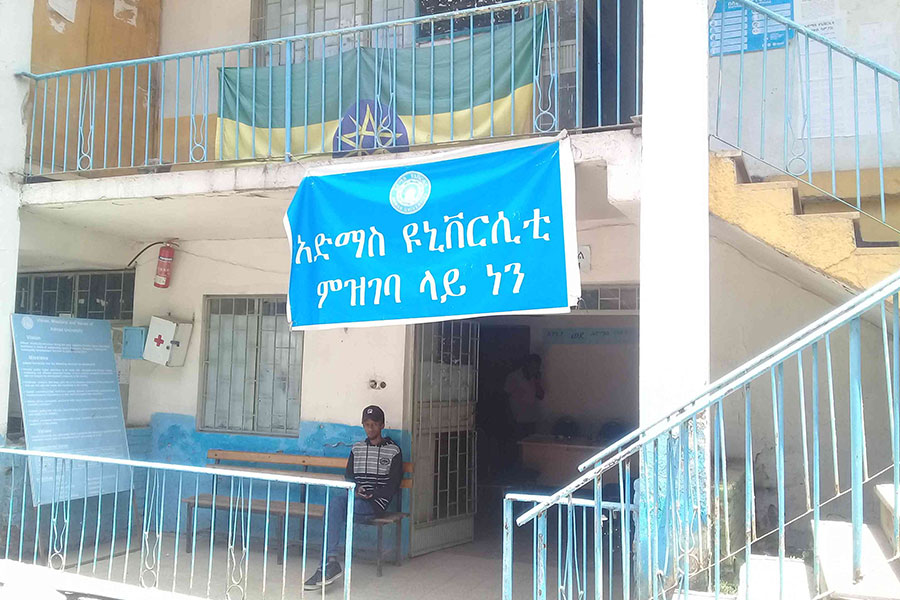
Editorial | Apr 22,2023
Apr 17 , 2020
By SEBLE WONDEMAGEGN ( FORTUNE STAFF WRITER )
A wing under the Ministry of Science & Higher Education has developed a digital learning platform and a library platform to continue the education that was cut off due to the Novel Coronavirus (COVID-19).
A team of six experts under the Ethiopian Education & Research Network has developed the e-learning system, which allows students to continue class online outside of a traditional classroom. The team also developed a digital library where students can study online. It took a month for the team to create both systems, which were launched two weeks ago.
Both the digital library and e-learning system will be overseen, monitored and regulated by the Ministry of Science & Higher Education.
“Developing an e-learning system was initially planned; however, because of the virus, we took immediate action using the material we had prepared so far,” said Zelalem Assefa, director general at the Research Network.
The digital library, which is set up on a local server, can be accessed through the internet after the user registers and is now on the website for students from the public and private universities. On the e-learning platform, university lecturers are required to upload courses and recordings to the site.
The government closed all private and public schools including universities due to the recent COVID-19 pandemic to prevent the potential transmission of the virus. Since the closure, students have returned home from all universities. Elementary and high school students are also staying at home.
The new system will help the students to continue their courses online, according to Zelalem.
For the current fiscal year, the country allocated 50.6 billion Br for education, which covers 13pc of the federal budget. The nation has 50 public universities, and 873,000 students were studying for their first degrees during the last academic year. There are also 38 teacher education colleges throughout the country that provide a three-year diploma in teaching through regular, summer and extension programmes. There are also over 174 private universities and colleges throughout the country.
The platforms also allow universities and educational & research institutions to use video conferences, upload teaching and learning materials, chat online and submit assignments. Currently, students that are from grades one to eight are taking their subjects through radio, while grades nine to twelve are using television and the Ministry of Education's website.
Anegagregn Gashaw, president of Debre Tabor University, says that digitising the educational system will help higher education institutions continue the education that was interrupted because of the virus.
“It’s important to have a digital learning platform, as it is not known when the spread of the virus will stop,” said Anegagregn. However, he has doubts about the accessibility of the internet for students coming from a rural area and the practicality of the system.
Currently, almost half of PhD and master's students are using the system, because they have access to the internet. However, undergraduate students who do not have a way to access the internet can only engage with the digital library and other software materials.
“We're negotiating with Ethio telecom to enable the online education system to operate for free,” said Zelalem. “Undergraduate students who have access to the internet can use the system after they are registered on the system by their lecturers.”
The systems also connect educational institutions and similar institutions throughout the world to enable them to share educational resources and collaborate both within Ethiopia and globally.
“There are 80,000 books and other modules that are uploaded on the digital library so far,” said Zelalem. "Students can access these through the website."
Mingezem Misganaw, founder of Hulumale e-commerce platform and a lecturer at the University of Gonder in the Department of Information Communication Technology, believes that having a digital library and e-learning system is a benefit to students and universities, since millions are spent on books and teaching materials.
“The good thing is that many students can read an online book at once, and they don’t get old and tear; however, I have doubts about how many students can learn online,” said Mingezem.
“E-learning has limitations in terms of students' access to the internet and their ability to afford devices,” said Mingezem, who also believes that using the e-learning system will help to exchange educational resources between students and lecturers in different universities.
PUBLISHED ON
Apr 17,2020 [ VOL
21 , NO
1042]

Editorial | Apr 22,2023

Fortune News | Jul 13,2024

Radar | May 15,2021

Radar | Jun 20,2020

Fortune News | Nov 24, 2024

Radar | Dec 21,2019

Radar | Jul 31,2021

Radar | Apr 08,2023

Agenda | May 21,2022

Fortune News | Jun 10,2023

Dec 22 , 2024 . By TIZITA SHEWAFERAW
Charged with transforming colossal state-owned enterprises into modern and competitiv...

Aug 18 , 2024 . By AKSAH ITALO
Although predictable Yonas Zerihun's job in the ride-hailing service is not immune to...

Jul 28 , 2024 . By TIZITA SHEWAFERAW
Unhabitual, perhaps too many, Samuel Gebreyohannes, 38, used to occasionally enjoy a couple of beers at breakfast. However, he recently swit...

Jul 13 , 2024 . By AKSAH ITALO
Investors who rely on tractors, trucks, and field vehicles for commuting, transporting commodities, and f...

Oct 25 , 2025
The regulatory machinery is on overdrive. In only two years, no fewer than 35 new pro...

Oct 18 , 2025
The political establishment, notably the ruling party and its top brass, has become p...

Oct 11 , 2025
Ladislas Farago, a roving Associated Press (AP) correspondent, arrived in Ethiopia in...

Oct 4 , 2025
Eyob Tekalegn (PhD) had been in the Governor's chair for only weeks when, on Septembe...